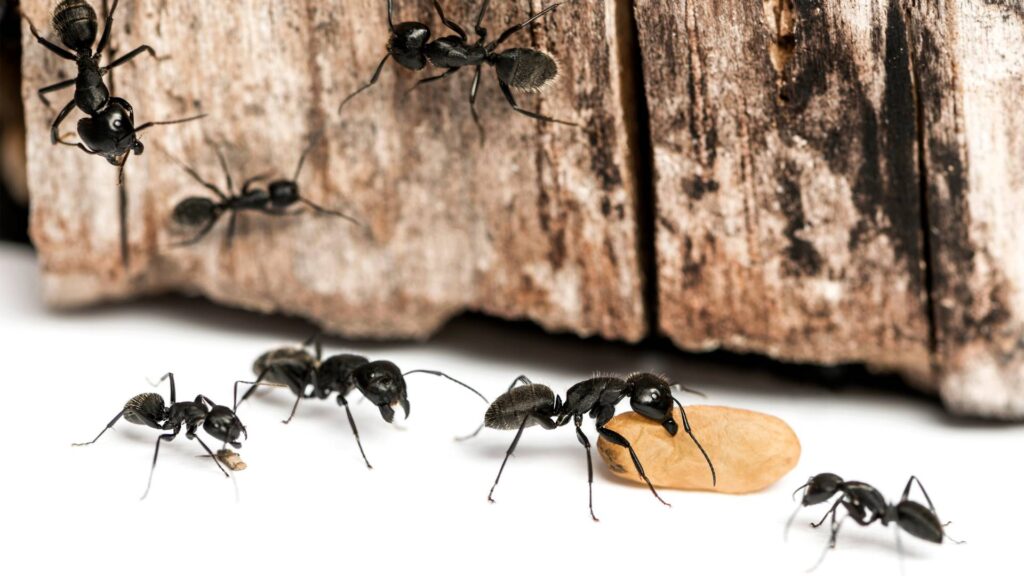Ants are a common sight in our gardens. While they can play a beneficial role in the ecosystem, large ant populations can become a nuisance.
But before you reach for chemical ant killers, consider natural remedies that are safe for your plants, pets, and the environment.
As a pest control expert, I’ve seen firsthand how these gentle methods can effectively manage ant issues without harming the delicate balance of your garden’s ecosystem.
Understanding Ants in Your Garden
Why Ants Are Attracted to Your Garden:
- Sweet Treats: Ants love sugary substances like honeydew produced by aphids. If your yard has an aphid problem, it will likely attract ants.
- Moisture: Ants seek moist environments for building nests. Overwatering or areas with poor drainage can create ideal ant habitats.
- Food Sources: Leftover food scraps, spilled drinks, or decaying plant matter can attract ants looking for a meal.
When Ants Become a Pest:
While ants can be beneficial, large populations can overwhelm yards. Here are some signs of a problematic ant infestation:
- Visible ant trails: Seeing long lines of ants marching across your plants.
- Ant mounds: Raised mounds of soil indicate a large ant colony.
- Plant damage: Ants feeding on aphids can indirectly damage your plants.
No More Ants: Let Our Skilled Team Safeguard Your Space!
Natural Remedies to Get Rid of Ants

Here are some natural treatments you can try to get rid of ants in your yard:
Eliminating Ants with Borax or Boric Acid
Caution: Borax and can be harmful to pets and children. Use with care and keep out of reach.
Here’s how to make a borax or boric acid bait:
- Mix Ratio: Combine equal parts borax with sugar and a little water to create a thick paste.
- Container Selection: Spread the paste on a small plate, lid, or cardboard cutout.
- Placement Strategy: Place the bait stations near ant paths or wherever you see ant activity. (Tip: You can use shallow lids from containers or even bottle caps to create mini bait stations.)
- Monitor and Refill: The ants will be attracted to the sugar and carry the borax or boracic acid back to the nest, eventually killing the colony. Monitor the bait stations and refresh the paste as needed.
Desiccating Ants with Diatomaceous Earth (DE)
DE is a safe and natural powder for gardens, but wear a mask when applying to avoid inhaling the dust.
How to use DE:
- Targeted Application: Sprinkle DE around ant paths , entry points to their nests, and any areas with high ant activity.
- Reapply as Needed: DE loses effectiveness when wet. After rain or watering, reapply the powder to maintain its desiccant properties.
Keep Your Home Ant-Free: Trust Our Proven Removal Solutions!
Repelling Ants with Soapy Water
Soapy water is a simple and non-toxic way to disrupt ant paths.
- Mixing the Solution: Combine a few tablespoons of dish soap with a gallon of water in a spray bottle.
- Direct Application: Spray directly on the ant paths or around areas where ants are entering your home or garden. The soap disrupts their communication pheromones, making it difficult for them to find their way back and forth.
Using Artificial Sweeteners as Ant Bait (Use with Caution)
While effective, this method can attract other unwanted invaders.
- Bait Creation: Mix equal parts borax or boracic acid with artificial sweetener (powdered or liquid) and a little water to form a paste.
- Application and Caution: Place the bait stations strategically near ant paths. Be aware that this method may also attract other sugar-loving insects.
Destroying Nests with Boiling Water (Use Caution)
Boiling water is a quick way to eliminate an ant nest, but use caution around plants.
- Targeted Approach: Carefully pour boiling water directly onto the visible ant nest opening. (Important: Wear gloves and eye protection for safety.)
- Repeat Treatment: Boiling water may not kill the entire colony in one go. You may need to repeat the treatment a few times for complete eradication.
Ant Problems? Get Fast, Effective Solutions by Contacting Us!
Disrupting Trails with the Garden Hose
A simple yet effective way to disrupt ant activity.
Water Blast: Use the jet setting on your garden hose to spray directly on the ant trails. The strong blast will disrupt their pheromone trails and discourage them from using that path again.
Dehydrating and Disrupting with Baking Soda and Baby Powder
These powders act as desiccants and disrupt ant communication.
Sprinkle Strategy: Sprinkle baking soda or baby powder liberally around ant trails and entry points to the nest. The powder will dehydrate the ants and disrupt their pheromone trails.
Residential pest control explores these natural remedies to effectively manage ant problems in your garden without compromising the health of your plants and pets.
Preventing Ant Infestations Naturally

Keeping ants out of your garden is the first line of defense. Here are some natural strategies to prevent them from establishing a foothold in the first place:
Importance of Garden Maintenance for Ant Deterrence
- Clear the Clutter: Regularly remove weeds, fallen leaves, and debris from your garden. These can provide shelter and nesting sites for ants.
- Trim Back Overgrowth: Overgrown plants can create bridges for ants to access your home or other structures. Keep your garden edges and flowerbeds neatly trimmed to discourage them.
- Practice Smart Composting: Locate your compost bin away from your house and garden to avoid attracting ants with food scraps.
Wipe Out Ants: Our Pest Control Experts Are at Your Service!
Utilizing Natural Barriers and Repellents
- Plant Power: Plant herbs like peppermint, lavender, or rosemary around your garden perimeter. These plants have natural ant-repelling properties. Consider planting marigolds or catnip near entry points to your home. The strong scents of these flowers may repel ants.
- Diatomaceous Earth (DE) Barrier: Create a physical barrier around your garden beds with crushed gravel or diatomite. This makes it difficult for ants to establish trails and discourages them from entering.
Sustainable Garden Practices to Minimize Ant Problems
Creating a healthy and balanced garden ecosystem can naturally discourage ant populations:
- Enhancing Soil Health to Discourage Ant Nesting: Promote healthy soil by adding compost and organic matter. Healthy soil attracts beneficial insects like ladybugs that prey on aphids, reducing the need for ants to control them. Earthworms also thrive in healthy soil, improving aeration and making it less hospitable for ant colonies.
- Water Management and Its Impact on Ant Populations: Avoid overwatering your garden. Excess moisture creates ideal conditions for ant hills. Water deeply and less frequently to encourage healthy root growth and discourage ant activity. Address any drainage issues in your garden that might create pockets of standing water.
- Balancing the Garden Ecosystem to Naturally Control Pests: Encourage a variety of plants and beneficial insects in your garden. This promotes a balanced ecosystem where natural predators like ladybugs and lacewings can help keep ant populations in check. Provide nesting sites for birds and encourage their presence in your garden. Birds can be effective predators on ants and other garden pests.
Ensure a Clean, Ant-Free Environment: Reach Out for Professional Help!
Embracing Natural Solutions for Ant Control
In my years of experience in pest control, I’ve seen firsthand the effectiveness of natural solutions in managing ant populations. While they may require a little more patience and effort than a quick chemical spray, the long-term benefits are undeniable.
Natural ant control fosters a healthier garden and a more balanced ecosystem. This, in turn, naturally discourages pests like ants, creating a safe space for you and your family to enjoy your outdoor haven.
Frequently Asked Questions About Home Remedies for Ants in Garden
How do I get rid of ants in my garden without killing plants?
To get rid of ants in your garden without killing plants, focus on non-toxic methods like soapy water, diatomaceous earth, or boiling water applied directly to the ant nests, ensuring minimal impact on your plants.
What is the best homemade outdoor ant killer?
The best homemade outdoor ant killer is a mixture of borax and sugar; this combination attracts ants, which then carry the borax back to their colony, effectively eliminating them without harsh chemicals.
Achieve Peace of Mind: Our Ant Removal Services Guarantee Results!
What is a natural ant repellent for vegetable gardens?
A natural ant deterrent for vegetable gardens is cinnamon, garlic, or peppermint oil; these substances are safe for plants and effectively deter ants without disrupting the garden’s health.


